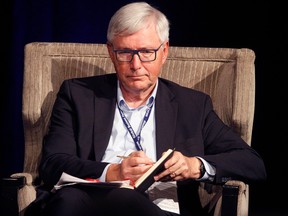Canada’s top trade bureaucrat criticized Beijing’s trading practices last year, but one ex-envoy says we should have been ‘more forceful’

Canada’s top trade bureaucrat criticized Beijing’s trading and business practices in meetings with his Chinese counterpart last year, an internal Global Affairs document indicates, but a former ambassador says the Canadian approach made Ottawa “sound like beggars.”
The briefing note for Rob Stewart, deputy minister of international trade, cited what it called unfair Chinese bans on imports of Canadian beef and pet food, obstructive regulations for foreign businesses, and favouritism toward state-owned and other domestic companies.
Stewart’s meeting with Wang Shouwen, vice minister of commerce, in Ottawa in March 2023 came after Canada’s trade deficit – the difference between what Canada exports to China and what it imports from there – soared 23 per cent in 2022 to $71 billion.
“The growing deficit does point to a worrisome trend,” says the note preparing Stewart for his meeting, obtained by the National Post through access-to-information legislation.
“I frequently hear from Canadian companies who relay concerns of market constriction in China … policies that tend to favour domestic over foreign,” said the document. “They also complain of opaque regulations, cumbersome licensing requirements, onerous ownership requirements and fierce competition due to market dominance of state-owned enterprises (SOEs).”
The meeting came four months after the Liberal government released its new Indo-Pacific Strategy, which signalled a more wary approach to “disruptive” China. “Canadian companies cannot ‘unsee’ past experiences of economic coercion,” says the briefing note, referring to the strategy.
Yet at the same time, it makes clear that Canada is anxious to continue doing business with China: “Noting significant differences in our political systems, disagreements are bound to happen. Importance is to maintain open lines of communication.”
A former Canadian diplomat in Beijing questioned the document’s tone given the longstanding nature of some of the problems.
Guy Saint-Jacques said the list of grievances was similar to when he was ambassador to China from 2012 to 2016, but that Canada’s response as laid out in the note seemed overly deferential.
“When you look at the talking points, we sound like beggars as we are pleading for the resumption of communication channels and we are asking them to be nice with us,” Saint-Jacques said by email. “The only language China understands is firmness and I think the (deputy minister) could have been more forceful.”
He said Stewart ought to have told China that it had to change its ways, open its markets as promised and stop harassing Canadian exporters, or Canada would look elsewhere, step up complaints to the World Trade Organization (WTO) and “work with our allies to stop you acting like a bully.”
The trade deficit with this country’s second-largest trading partner did shrink somewhat in 2023, to about $59 billion, as imports from China fell and Canadian exports rose slightly.
Global Affairs Canada spokesman Jean-Pierre Godbout did not respond directly to questions about whether any of Stewart’s list of irritants had been resolved over the last year.
But “(Chinese) trade barriers and non-market policies continue to affect Canadian exports,” he said. “We will continue to work in support of open, transparent and rules-based trade.”
He added that Wang “expressed an openness to strengthening the two-way trading relationship between Canada and China.”
A Chinese embassy spokesperson, meanwhile, says Beijing wants a “win-win” commercial relationship between the two countries, seeing them as partners, not rivals.
The Chinese embassy spokesperson said the country has never deliberately sought a trade surplus with Canada and would like to see mutual trust and dialogue between the two nations.
“China and Canada have never been rivals, but partners,” the person said. “China is unswervingly expanding its opening up to the outside world … We hope that Canada will meet China half way and create a fair, just, and non-discriminatory business environment for bilateral economic and trade cooperation.”
The briefing note says Canada itself has 49 anti-dumping and countervailing measures in place against China across 26 products, responding to goods allegedly exported below fair market value or with significant government subsidies, respectively.
And it chastises China for keeping the WTO in the dark about what it calls “massive subsidies” to its industries, including steel and others with global excess capacity.
“The lack of transparency is a major concern as China fails to notify the WTO or respond to questions by WTO members about its subsidies.”
The briefing note says Canada is not concerned with China’s many state-owned enterprises in and of themselves, but about the fact they compete with private firms from a privileged position, “giving them an unfair competitive advantage over commercial rivals.”
It also highlighted two specific trade barriers it said needed urgent action. China has banned Canadian beef since Canada announced a single case of atypical BSE, or mad-cow disease, in 2021, while heat-treated dried pet food was prohibited because of the presence in chicken of “highly pathogenic avian influenza.” In both cases, the World Organization for Animal Health says the products pose no human health risk.
China does import pet food from other countries with HPAI chicken, suggesting the Canadian ban is “discrimination,” says the document.
Likewise, China’s apparent objections to Canada requiring COVID testing for Chinese travellers earlier earned a slightly incredulous response.
“Surprised you would raise this given China’s own measures,” said the note. “Can you explain why you imposed test requirements (and more) on inbound travellers but object when others do the same?”
As for Taiwan, “Canada continues to uphold its one-China policy,” says the document. “Canada does not recognize Taiwan as a sovereign state but we continue to maintain unofficial but valuable economic, cultural and people-to-people ties with Taiwan.”
Our website is the place for the latest breaking news, exclusive scoops, longreads and provocative commentary. Please bookmark nationalpost.com and sign up for our newsletters here.